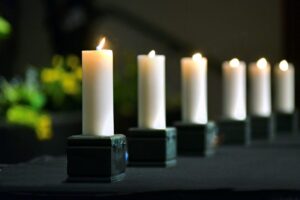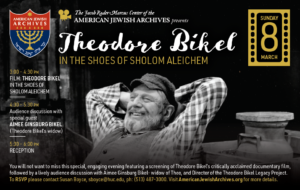Yom Hashoah 2020: A Week of Digital Holocaust Remembrance
 While we are unable to gather in person for Yom HaShoah (Holocaust Remembrance Day), please join us online Sunday, April 19 through Thursday, April 23 for a week of moving Holocaust remembrance programs to remember the six million victims of the Holocaust and honor the survivors. Below is the full schedule of events, which can also be viewed online at: holocaustandhumanity.org/yom-hashoah-2020/
While we are unable to gather in person for Yom HaShoah (Holocaust Remembrance Day), please join us online Sunday, April 19 through Thursday, April 23 for a week of moving Holocaust remembrance programs to remember the six million victims of the Holocaust and honor the survivors. Below is the full schedule of events, which can also be viewed online at: holocaustandhumanity.org/yom-hashoah-2020/
Sunday, April 19 at 1:00 PM
Webinar with Dr. Rachel Korazim on “Facing Absence”
For many years Holocaust (Shoa) commemoration focused on the horrible loss and its cruel details. The laws, the markings, the segregation, deportation and murder. Our songs and stories tried hopelessly to capture the pain and the indescribable suffering. We should never let them be erased and forgotten. Yet it is time for us to try and capture the memory of their lives and make them our memories. We need to understand that they did not just disappear – they left us a legacy of how of how to walk in their footsteps. Visiting the places they lived in even when all we have is a wall, an empty lot or a synagogue turned into community center – should become part of our journey.
This is an invitation to join my journey to rural Hungary in the wine land of Tokai:
We will explore the renewal of Jewish life in the beautifully renovated synagogue of Mad. We will imagine back Jewish family life as we face the empty lot where the Mikve (ritual bath) stood. We will listen to music still sung in those parts and remember the rabbis who composed it. The main centers of Jewish life nowadays are in North America and in Israel yet our memories linger on in Europe, in the land our forefathers and mothers called home. These too we are commended to remember.Register here for the Zoom webinar with Dr. Korazim.
Monday, April 20 at Noon
Performance by Violinist Guy Braunstein
Watch acclaimed violinist and Cincinnati Symphony Orchestra’s 2019-2020 Artist-in-Residence Guy Braunstein perform meaningful musical selections.
Performance video will be available on HHC’s Facebook and Vimeo pages.
Tuesday, April 21 at Noon
Virtual Commemoration: How We Will Carry Their Memory
Join us for a virtual commemoration including readings, candle lighting, and a communal moment of silence at 12:15 PM. If you cannot join us online, we invite you to take a moment of silence and light a candle in your home to remember those who perished in the Holocaust.
Register here for the Zoom commemoration.
Wednesday, April 22 at 11:00 AM
Holocaust Survivor Testimony
Local Holocaust survivor Zahava Rendler will share her story of living in hiding as a child during the Holocaust as part of our Holocaust Speaker Series, sponsored by Margaret and Michael Valentine.
Register here for the Zoom program.
Thursday, April 23
Carrying Remembrance into the Future
11:00 AM: View local Holocaust survivor Dr. Michael Meyer’s oral history interview to learn about his experience fleeing the Holocaust.
Dr. Meyer’s interview will be available on HHC’s Facebook and Vimeo pages.
Throughout the Day: Watch students perform poems inspired by the experiences of local Holocaust survivors and hear essays written by students reflecting on the importance of continuing to tell the stories of Holocaust survivors.
Videos will be posted throughout the day on HHC’s Facebook page.
We look forward to seeing you online during our Week of Remembrance, presented in partnership with the Jewish Federation of Cincinnati, Jewish Family Service, and the Mayerson JCC.
Questions? Please contact Sarah Schneider at sschneider@cincyhhc.org or (513) 487-3055.
Unprecedented times can bring out the best in humanity. As this situation evolves, the Holocaust & Humanity Center remains steadfast in its mission of ensuring the lessons of the Holocaust inspire action today. Your support helps us move forward during this time. We encourage you to consider donating to HHC as an investment in our mission.

 While we are unable to gather in person for Yom HaShoah (Holocaust Remembrance Day), please join us online Sunday, April 19 through Thursday, April 23 for a week of moving Holocaust remembrance programs to remember the six million victims of the Holocaust and honor the survivors. Below is the full schedule of events, which can also be viewed online at:
While we are unable to gather in person for Yom HaShoah (Holocaust Remembrance Day), please join us online Sunday, April 19 through Thursday, April 23 for a week of moving Holocaust remembrance programs to remember the six million victims of the Holocaust and honor the survivors. Below is the full schedule of events, which can also be viewed online at:  While we are unable to gather in person for Yom HaShoah (Holocaust Remembrance Day), please join us online Sunday, April 19 through Thursday, April 23 for a week of moving Holocaust remembrance programs to remember the six million victims of the Holocaust and honor the survivors. Below is the full schedule of events, which can also be viewed online at:
While we are unable to gather in person for Yom HaShoah (Holocaust Remembrance Day), please join us online Sunday, April 19 through Thursday, April 23 for a week of moving Holocaust remembrance programs to remember the six million victims of the Holocaust and honor the survivors. Below is the full schedule of events, which can also be viewed online at: 
